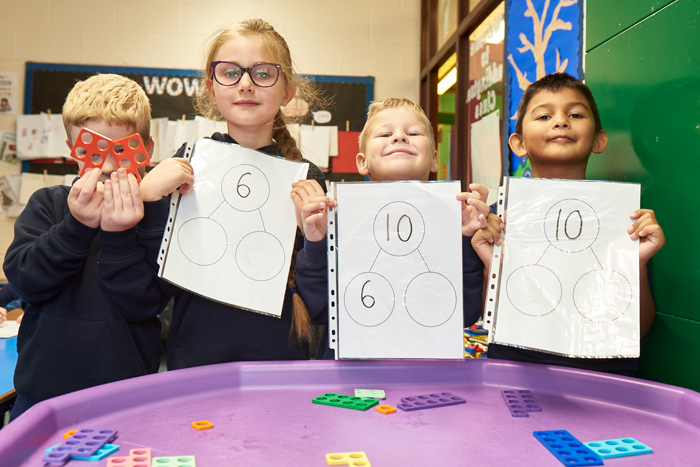Mathematics at NWAS
Mathematics is fundamental to everyday life- it is all around us in the real world and is a lifelong skill.
We use mathematical concepts, as well as the skills we learn from doing mathematical problems,every day. It teaches children how to make sense of the world around them, whether it be calculating the amount of money they need to purchase an item or weighing ingredients when following a recipe.
We believe mathematics is full of exciting opportunities that allow children to be explorative in their learning and to solve problems in a range of contexts.
We plan and teach a mastery approach that is consistent with the aims and objectives of the National Curriculum. We have chosen to deliver the curriculum through the White Rose Maths scheme because it is well-sequenced to avoid learning deficits and supports a mastery approach to teaching and learning in maths. Our mathematics curriculum is split into three strands: fluency, reasoning and problem solving.
At Naphill we aim for children to develop a positive attitude towards maths that will stay with them at each step of their education and on into adult life. Our ambition is that children leave our school as confident and resilient problem solvers with the vocabulary necessary to reason mathematically.
We aim for our pupils to be fluent with key number facts and to calculate accurately and efficiently using the four operations. As a school, we endeavour to guide children through the problem solving process.
We achieve this in 4 ways:
1. Putting number first– our planning and teaching schemes have number at their heart. A significant amount of time is spent reinforcing number in order to build competency and ensure children can confidently access the rest of the curriculum.
2. Depth before breadth – by using a progression of skills teachers stay within the required key stage so that children acquire depth of knowledge in each topic. Opportunities to revisit previously learned skills are built into later blocks.
3. Working together – children progress through the scheme as a whole group, encouraging all abilities to support each other in their learning.
4. Fluency, reasoning and problem solving – our planning and teaching develop all three key areas of the National Curriculum, giving children the knowledge and skills they need to become confident mathematicians.

Intent
To plan and teach a mastery curriculum that enables children to:
- be fluent in mental and written calculation skills related to their year group
- have the ability to apply fluent mental and arithmetic skills to tackle reasoning and problemsolving tasks logically
- develop independence in maths by using the 5R
- link mathematical concepts together (using the CPA model) to support their understanding and build upon what they already know
- be able to apply previous knowledge to new concepts
- have a ‘can do’ attitude and feel confident in their own mathematical ability
- have a suitable technical vocabulary to articulate their responses
- enjoy mathematical opportunities and engage fully in lessons
Implementation
Our maths curriculum is carefully planned and delivered to ensure children achieve our Intent.
We use:
- The national curriculum objectives which are incorporated into short term planning supported by the White Rose small steps scheme and our calculation policy. This provides a cycle of objectives to build upon previous knowledge year on year and a coherent sequence of bite sized chunks.
- The CPA (Concrete Pictorial Abstract) model to build competency in new concepts
- A focus on key learning, reasoning and problem solving, key questions, and sentence stems.
- Opportunities for collaboration and an emphasis on peer discussion and good quality maths talk and questioning
- Differentiation to meet the needs of the children within the class whilst still providing each child with the opportunity to achieve the learning intentions to meet the expectations of their year group.
- A variety of resources to create engaging lessons
- Formative and summative assessment to identify gaps, ensure good progress; to know how children are doing and what they need to do next
- Questioning and good maths talk to ensure children are engaged and able to articulate responses.
- Maths homework set in each year group to consolidate learning
- Interventions to support children where necessary
Impact
Through careful planning and teaching, our children:
Have quick recall of basic number facts and times tables and a good understanding of place
value
- Understand how new concepts build upon previous learning
- Apply their computational skills to reasoning and problem solving tasks
- Who are lagging behind are identified and interventions or support put in place
- Consistently use the 5rs in maths lessons – especially reasoning and resilience and are willing to try tasks that may challenge their thinking
- Make good progress year on year relative to their starting point
- Have a sense that everyone can succeed.
- Talk enthusiastically about their maths learning and show good engagement in lessons.
- Follow a clear progression and consistent approach in the teaching of calculations
- Hear and use a consistent and agreed mathematical vocabulary.
Our Staff:
- Have access to engaging and quality resources
- Have a clear progression of skills and knowledge to teach
- Have an understanding of the mastery approach and how it embeds deeper learning
- Have strategic overview of the requirements for teaching and learning that needed to be met over a period of time (week/term/year)
- Are consistent with their use of vocabulary and key models (CPA)
- Know how to teach calculations in line with school policy
- Can identify gaps and misconceptions and plan to correct them

